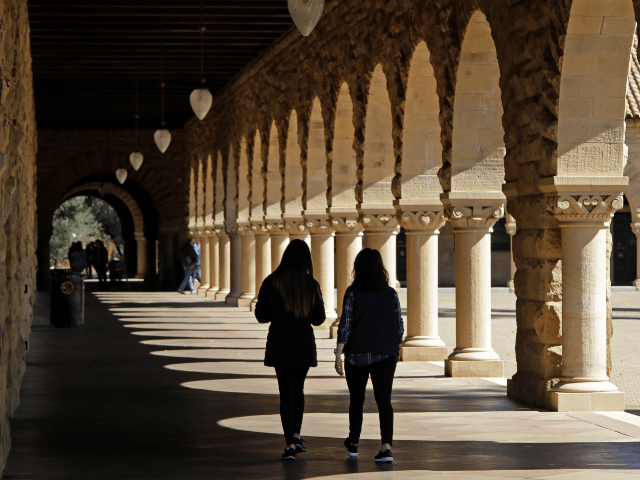The Department of Education published a report on Tuesday that found American colleges are illegally failing to report large gifts from foreign sources. Major universities listed in the report did not dispute its findings, pledging instead to cooperate with investigators.
Education Secretary Betsy DeVos said her investigators found “pervasive noncompliance by higher ed institutions and significant foreign entanglement with America’s colleges and universities.”
DeVos said her department’s initial investigation found $6.5 billion in “previously unreported foreign funds. According to the report, most of the foreign money went to “a relatively small number of large institutions, many of which appear to have inadequately, or in some cases failed entirely, to report as required by law.”
“The threat of improper foreign influence in higher education is real. Our action today ensures that America’s students, educators, and taxpayers can follow the money. Transparency in foreign funding of higher education is not just something I think is a good thing; it’s the law. For too long, enforcement of that law was lax, but not anymore,” DeVos said.
The Department of Education investigation tracks closely with independent reporting on the shadowy network of foreign donors pumping billions of dollars into American universities, including money from hostile powers like China. The Education and State Departments issued a joint warning two weeks ago that investigations of these foreign donations were underway, advising university administrators to resist and report efforts by the Chinese Communist Party (CCP) to influence American college curricula and conduct espionage operations.
The report noted that even the declared contributions from foreign donors are troubling, with billions of dollars rolling in from governments that have authoritarian political agendas and severe human rights issues – and those billion-dollar sums are only “a fraction of the true total.”
The report pointed out that reporting requirements for foreign donations have been in place for decades, but compliance has been astonishingly lax, and few serious efforts have been made to investigate unreported donations. Many of the institutions of higher learning investigated under Secretary DeVos have “aggressively pursued and accepted foreign money while failing to comply” with the relevant laws – even though they were “large and well-resourced” even without foreign money, they enjoy huge “direct and indirect subsidies from U.S. taxpayers,” and they have “encumbered Americans with staggering debt loads” by raising tuition and causing student loan burdens to skyrocket.
The authors of the report were highly suspicious of the motives of these major universities since the reporting requirements are “neither complicated nor burdensome,” and there are substantial reasons to believe that universities which obsessively “track every cent owed and paid by their students” are also carefully monitoring millions of dollars from foreign supporters.
“The evidence shows the industry has at once massively underreported while also anonymizing much of the money it did disclose, all to hide foreign sources (and correspondingly, their influence on campus) from the Department and the public,” the report charged.
“Obviously, responsible American college and university administrators and fundraisers should be sensitive to the relevant geopolitical context and properly scrutinize financial relationships that might serve as potential vehicles of adversarial foreign influence, particularly in dealings with strategic competitors,” the authors wrote.
“This is far from some arcane duty or burdensome obligation as some have suggested,” DeVos said when introducing the report. “Think about the tremendous wealth of information and resources accessible to foreign adversaries at our nation’s institutions of higher education – military secrets, energy and medical breakthroughs, cutting-edge technology, endless valuable IP, and of course our most valuable resource, America’s young minds. The threat is real, so we took action to make sure the public is afforded the transparency the law requires.”
The background history presented with the report said the education industry’s “entanglement with foreign adversaries” became significantly worse after 9/11, when “Saudi Arabia began advancing Islamic ideology across the globe through multimillion-dollar donations to elite Western institutions, such as Harvard University and Cambridge University.” During that same period, American universities grew more eager to enroll foreign students – and adversarial governments like Russia, and especially China, moved quickly to exploit that appetite.
In a section with some redacted names, presumably for legal or national security reasons, the report highlights a few foreign state-owned and influenced corporations that made troubling donations of money and resources to American universities, including China’s Huawei and Alibaba, and Russia’s Kaspersky Government Security Solutions.
The Associated Press (AP) reported some pushback from the higher education industry, including the Association of American Universities, which denounced the report as “less a serious security assessment than it is a partisan and politically driven attack on America’s leading research universities.”
“While the Department of Education purports to be concerned about threats, it has consistently failed to respond to repeated requests for clarity, transparency, and guidelines,” the association said.
The AP noted, however, that many of the institutions spotlighted in the report have admitted their reporting of foreign donations was mistaken or incomplete, and the Education Department intensified its investigations after bipartisan reports from Congress warned about the influence of hostile foreign governments on American universities, especially China.
University administrators generally acknowledged the Education Department’s findings and pledged to work closely with investigators, although some complained the reporting rules are not as clear as the Department of Education maintains, and said the Department could be more helpful in ensuring proper compliance.
The Harvard Crimson, for example, quoted a university spokesman who said disclosure forms were “recently updated” to “reflect Department of Education criteria,” resulting in a broader range of contracts appearing in Harvard’s latest reports to the Education Department.

COMMENTS
Please let us know if you're having issues with commenting.